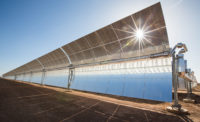Morocco says development of five solar-power projects, estimated at $9.5 billion total, will proceed despite threats by some European financiers to pull out of the initiative because of the controversial presence of the country’s administration in the former Spanish colony of Western Sahara.
Moroccan Foreign Minister Salaheddine Mezouar, as quoted by Reuters in early February, told the reluctant investors that Morocco has “no financing problems. We have several [investors]. There are the Japanese, Chinese and Gulf countries.”
Moroccan authorities, however, have yet to reveal which lenders have solidified pledges to fund the ambitious energy development program.
Undisclosed sources at Germany's state-owned banks and at multi-lateral lenders, including the World Bank, the European Investment Bank and the European Union, told the region's news agencies that they are unwilling to finance solar projects located in the disputed Western Sahara, which has been occupied by Morocco since Spain pulled out in 1975.
Morocco is constructing solar powerplants at five sites: Quarzazate, Ain Bni Mathar, Foum Al Oued, Boujdour and Sebkhat Tah. Scheduled to be in operation by 2020, their combined capacity is 2,000 MW.
Other lenders that pledged funding, including the African Development Bank, the French Development Agency and Germany's KFW bank, have not given their official position on the contentious issue; however, last October, the EU stated, “Western Sahara’s status is a sensitive issue as some fear that EU-Morocco projects would help preserve the status quo.”
The Quarzazate project is being developed in four phases, and a $1-billion contract already has been awarded for the development of phase one, which includes a 500-MW substation. The Saudi International Co. for Water and Power is developing the first 160 MW of the first phase, said to be the largest such solar project in the world. The power is expected to be injected into the national grid by 2015. A consortium of three Spanish firms—Sener, Acciona and TSK—has been awarded the construction contract.
Last October, KFW announced $900 million in funding for two phase-two solar plants, which have an overall capacity of 300 MW. The two plants will cost an estimated $2.3 billion to complete.
Morocco, the largest energy importer in the Middle East and North Africa region, hopes to benefit from the $1-billion Energy Development Fund, established by multilateral lenders to development the country’s renewable energy sources. Saudi Arabia, the United Arab Emirates and the Hassan II Fund are among the financiers.
"The other four plants will also happen. The goal is to achieve 2,000 MW, and we will continue with our plan. The Western Sahara issue has nothing to do with it. The financing is not conditioned on whether plants are in the Sahara or not," the minister was quoted saying.
"Western Sahara needs renewable energy, and the investment will be made. If some people don't want to come, others will."
Completion of the five solar powerplants is expected to help Morocco, which imports 95.6% of its energy. The country hopes to meet its 5.7% annual energy consumption rate and reduce its energy bill from the current $10 billion.


Post a comment to this article
Report Abusive Comment